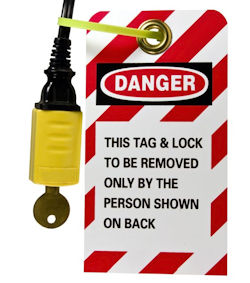Facts About Lockout/Tagout Devices
Lockout and tagout devices must meet the following criteria to ensure that they are effective and not removed inadvertently:
- Durable: Lockout devices must work properly under the environmental conditions in which they are used. Warnings on tagout devices must be legible even in wet, damp, or corrosive conditions.

Lockout/Tagout devices must be substantial and durable.
Courtesy: Safety Signs
Courtesy: Safety Signs
- Standardized: Lockout and tagout devices must be designated by color, shape, or size. Tagout devices must have a standardized print and warning format.
- Substantial: Lockout devices and tagout devices must be strong enough that they cannot be removed inadvertently. Tagout devices must be attached with a single-use, self-locking material such as a nylon cable tie with a minimum unlocking strength of 50 pounds.
- Identifiable: Any employee who sees a lockout or tagout device must recognize who attached it and understand its purpose. The device must not be used for purposes other than the control of hazardous energy.
- Unique: Each lock must have a unique key; this means that only the employee who uses the lock has the key to that lock.
- Payment: If you are an employer, you must provide lockout and tagout devices to employees who need to shut down equipment to service or maintain it.
Knowledge Check Choose the best answer for the question.
1-10. Who is responsible for providing lockout and tagout devices?
You forgot to answer the question!
